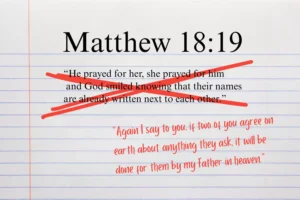I’ve always been a bit of a scaredy-cat. But lately, fear seems to be getting to me more than usual. It’s a little bit like being a hypochondriac — someone who constantly worries that they have a life-threatening medical condition; when something goes wrong, I immediately consider the worst-case scenario. To be honest, some of my fears are founded, such as my worries about how my son with special needs will fare in this world. But other concerns, such as being terrified that the bump inside my nose is incurable cancer (it was a clogged duct) or wondering what’s going to happen when the next US president is voted in — are a little overly dramatic, not to mention, paralyzing.
I think I must feel a bit like Peter felt when Jesus asked him to walk on the water. I’m going along, doing the things the Lord is calling me to do, trying to keep my eyes on Him, but then I look around; I begin to think about all of the things that could go wrong (and there are A LOT of things). Fear grabs a hold, and I begin to sink.
In his article, “Five Points For All Our Fears,” Paul Maxwell writes about childhood nightmares and what replaces them.
Dreams can still be scary, but reality is straight terrifying. That’s why people drink at night while they watch Netflix. That’s why people jump on their favorite app — Instagram, Minecraft, or Facebook — when they’re waiting on bad news. That’s why we check our phone for texts first thing in the morning. That’s why the Psalmist cries, “In the night my hand is stretched out without wearying; my soul refuses to be comforted” (Psalm 77:2).
Life is scary. But I don’t like to be fearful. In fact, I sometimes wonder why I am. If I believe that Jesus is who He says He is, I have nothing to fear. I can say with Paul, “To live is Christ, and to die is gain” (Philippians 1:21). But the circumstances I’m facing rarely make such a declaration so simple. Maxwell goes on to offer this comforting thought:
Our terrors are a participation in the sufferings of Christ (1 Peter 4:13). Our moments of overwhelming anxiety are our walking hand-in-hand with Jesus in the Garden of Gethsemane — Satan’s house-of-horrors made specifically for Christ — which Christ endured specifically for us, so that we would endure specifically because of him.
Fear is part of being human. Maybe that’s why the phrases “do not be afraid” and “will not be afraid” appear more than 40 times in Scripture — always in relation to trusting God as the solution. Psalm 56:4 is a perfect example: “In God, whose word I praise, in God I trust; I shall not be afraid. What can flesh do to me?” God’s answer for our fears is trust. Fear can drive us to God, who loves us, protects us, fights for us. And as we experience His perfect love, fear dissipates.
I’ll probably always struggle with being a bit of a life hypochondriac. And some of my fears will become realities. But through it all, my God invites me to cast my cares on Him because He cares for me. And that gives me courage.











